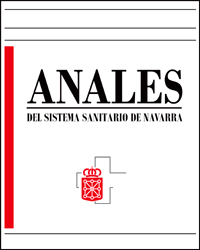Aplicación de un protocolo de manejo de masas anexiales: ahorro en actividad clínicamente innecesaria y costes
##plugins.pubIds.doi.readerDisplayName##:
https://doi.org/10.23938/ASSN.0863Gako-hitzak:
Masa anexial., Clasificación GI-RADS., Cirugías innecesarias., Seguridad del paciente.Laburpena
Background. Evaluate whether the implementation of an adnexal masses protocol, based on the GI-RADS system, allows a correct management of these masses, avoiding unnecessary clinical activity produced by overdiagnosis and overtreatment, as well as cost savings.
Methods. Retrospective cohort study (July 2015 - June 2017) including women treated at the Gynaecology clinic of the Hospital Universitario Rey Juan Carlos (Móstoles, Madrid), with detection of an adnexal mass in high resolution echography. Adnexal masses were classified by the GI-RADS system, and together with the echographic image and menopausal status, surgery or follow-up was decided.
Results. A total of 154 women were studied, 24 % with images suggesting malignancy (G4 and G5). Surgery was performed on 33.1 % of adnexal masses; 33.3 % of them were ovarian carcinoma, mainly (88.2 %) in postmenopausal women with echographic images suggesting malignancy. Three point two percent of patients rejected the recommended surgery. During follow-up 21.4 % of the masses disappeared, 61 patients were only monitored due to a stable mass and two (1.3 %) due to surgical risk. Eventually, 96 (62.3 %) surgeries were avoided, achieving a 57,683 Euro saving.
Conclusions. The application of a protocol based on the GI-RADS classification system avoided unnecessary surgeries, as well as the consequences and economical cost produced by them. Thus, this protocol is a useful and practical tool for the monitoring and treatment of adnexal masses.
##plugins.generic.usageStats.downloads##
Erreferentziak
SOLNIK MJ, ALEXANDER C. Ovarian incidentaloma. Best Practice & Research Clinical Endocrinology & Metabolism 2012; 26: 105-116. https://doi.org/10.1016/j.beem.2011.07.002
GASPAROV A, ZHORDANIA, PAIANIDI I. [Oncogynecological aspects of adnexal masses]. Vestnik Rossiiskoi Akademii Nauk 2013; 8: 9-13.
HEINTZ APM, ODICINO F, MAISONNEUVE P, QUINN MA, BENEDET JL, CREASMAN WT et al. Carcinoma of the ovary. FIGO 26th Annual Report on the Results of Treatment in Gynecological Cancer. Int J Gynaecol Obstet 2006; 95: S161-192. https://doi.org/10.1016/S0020-7292(06)60033-7
FROYMAN W, LANDOLFO C, DE COCK B, WYNANTS L, SLADKEVICIUS P, TESTA AC et al. Risk of complications in patients with conservatively managed ovarian tumours (IOTA5): a 2-year interim analysis of a multicentre, prospective, cohort study. Lancet Oncol 2019; 20: 448-458. https://doi.org/10.1016/s1470-2045(18)30837-4
RECARI E, OROZ LC, LARA JA. Complicaciones de la cirugía ginecológica. Anales Sis San Navarra 2009; 32 (Suppl 1): 65-79. https://doi.org/10.4321/s1137-66272009000200008
MENON U, GENTRY-MAHARAJ A, HALLETT R, RYAN A, BURNELL M, SHARMA A et al. Sensitivity and specificity of multimodal and ultrasound screening for ovarian cancer, and stage distribution of detected cancers: results of the prevalence screen of the UK Collaborative Trial of Ovarian Cancer Screening (UKCTOCS). Lancet Oncol 2009; 10: 327-340. https://doi.org/10.1016/s1040-1741(09)79370-4
SIEGEL RL, MILLER KD, JEMAL A. Cancer statistics, 2018. CA Cancer J Clin 2018; 68: 7-30. https://doi.org/10.3322/caac.21442
TIMMERMAN D, VALENTIN L, BOURNE TH, COLLINS WP, VERRELST H, VERGOTE I. Terms, definitions and measurements to describe the sonographic features of adnexal tumors: a consensus opinion from the International Ovarian Tumor Analysis (IOTA) group. Ultrasound Obstet Gynecol 2000; 16: 500-505. https://doi.org/10.1046/j.1469-0705.2000.00287.x
TIMMERMAN D, TESTA AC, BOURNE T, AMEYE L, JURKOVIC D, VAN HOLSBEKE C et al. Simple ultrasound-based rules for the diagnosis of ovarian cancer. Ultrasound Obstet Gynecol 2008; 31: 681-690. https://doi.org/10.1002/uog.5365
AMOR F, VACCARO H, ALCÁZAR JL, LEÓN M, CRAIG JM, MARTINEZ J. Gynecologic Imaging Reporting and Data System: a new proposal for classifying adnexal masses on the basis of sonographic findings. J Ultrasound Med 2009; 28: 285-291. https://doi.org/10.7863/jum.2009.28.3.285.
AMOR F, ALCÁZAR JL, VACCARO H, LEÓN M, ITURRA A. GI-RADS reporting system for ultrasound evaluation of adnexal masses in clinical practice: a prospective multicenter study. Ultrasound Obstet Gynecol 2011; 38: 450-455. https://doi.org/10.1002/uog.9012
KLEINERT S, HORTON R. From universal health coverage to right care for health. Lancet 2017; 390: 101-102. https://doi.org/10.1016/s0140-6736(16)32588-0
SOCIEDAD ESPAÑOLA DE GINECOLOGÍA Y OBSTETRICIA. Evaluación diagnóstica de las masas anexiales. Prog Obstet Ginecol 2016; 59: 443-449.
CABO J. Gestión sanitaria integral: pública y privada. 2010. https://www.gestion-sanitaria.com/2-calculo-costes.html
O’SULLIVAN JW, MUNTINGA T, GRIGG S, IOANNIDIS JPA. Prevalence and outcomes of incidental imaging findings: umbrella review. BMJ 2018; 361: k2387. https://doi.org/10.1136/bmj.k2387
BUYS SS, PARTRIDGE E, BLACK A, JOHNSON CC, LAMERATO L, ISAACS C et al . Effect of screening on ovarian cancer mortality: The Prostate, Lung, Colorectal and Ovarian (PLCO) cancer screening randomized controlled trial. JAMA 2011; 305: 2295-2303. https://doi.org/10.1001/jama.2011.766
JACOBS IJ, MENON U, RYAN A, GENTRY-MAHARAJ A, BURNELL M, KALSI JK et al. Ovarian cancer screening and mortality in the UK Collaborative Trial of Ovarian Cancer Screening (UKCTOCS): a randomised controlled trial. Lancet 2016; 387: 945-956. https://doi.org/10.1016/S0140-6736(15)01224-6
LA PARRA CASADO C, MOLINA FÀBREGA R, FORMENT NAVARRO M, CANO GIMENO J. Estudio de las enfermedades de las trompas de Falopio mediante resonancia magnética. Radiologia 2013; 55: 385-397. https://doi.org/10.1016/j.rx.2012.10.003
BIGGS WS, MARKS ST. Diagnosis and management of adnexal masses. Am Fam Physician 2016; 93: 676-681.
DODGE JE, COVENS AL, LACCHETTI C, ELIT LM, LE T, FUNG-KEE-FUNG M et al. Management of a suspicious adnexal mass: a clinical practice guideline. Curr Oncol 2012; 19: e244-e257. https://doi.org/10.3747/co.19.980
##submission.downloads##
Argitaratuta
##submission.howToCite##
Zenbakia
Atala
##submission.license##
##submission.copyrightStatement##
##submission.license.cc.by-sa4.footer##La revista Anales del Sistema Sanitario de Navarra es publicada por el Departamento de Salud del Gobierno de Navarra (España), quien conserva los derechos patrimoniales (copyright ) sobre el artículo publicado y favorece y permite la difusión del mismo bajo licencia Creative Commons Reconocimiento-CompartirIgual 4.0 Internacional (CC BY-SA 4.0). Esta licencia permite copiar, usar, difundir, transmitir y exponer públicamente el artículo, siempre que siempre que se cite la autoría y la publicación inicial en Anales del Sistema Sanitario de Navarra, y se distinga la existencia de esta licencia de uso.








